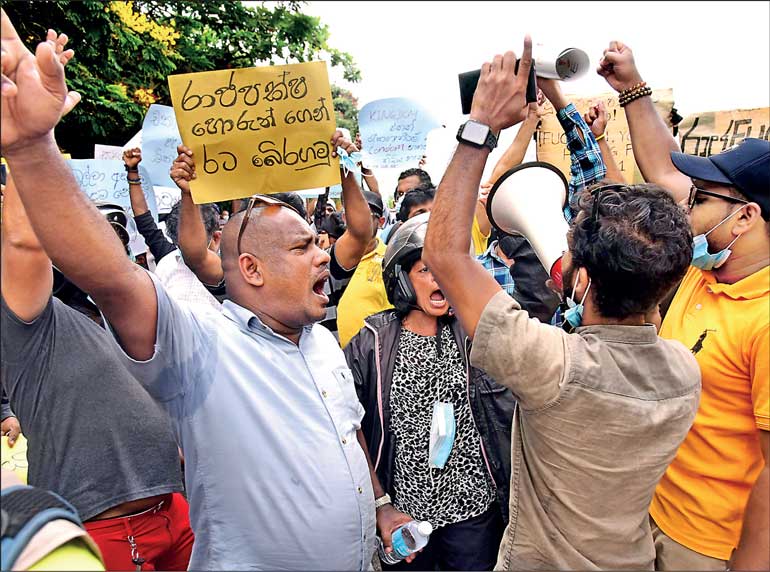Tuesday Feb 17, 2026
Tuesday Feb 17, 2026
Friday, 8 April 2022 00:00 - - {{hitsCtrl.values.hits}}

As Egyptians demanded “bread and dignity” before calling Mubarak to quit, Sri Lankans also started demanding “food and fuel” before shouting “Gota Go Home”
Sunday, 3 April 2022 was a momentous day in the 74 years post-independence history of Sri Lanka. It was a day when Sri Lankans, irrespective of ethnic, language and religious differences, bravely defied President Gotabaya Rajapaksa’s curfew order and confronted security forces to send him a message, loud and clear, that enough was enough and that the regime should pack up and leave. They were joined by thousands of diaspora Sri Lankans who also endorsed that message.
was a day when Sri Lankans, irrespective of ethnic, language and religious differences, bravely defied President Gotabaya Rajapaksa’s curfew order and confronted security forces to send him a message, loud and clear, that enough was enough and that the regime should pack up and leave. They were joined by thousands of diaspora Sri Lankans who also endorsed that message.
Although around 600 were said to have been arrested in Western Province and water cannons were used by police to disperse rioting undergraduates at Peradeniya, it was, on the whole, a peaceful outpour of anger and frustration at a regime, which had recked the economy of the country, bankrupted its coffers and ruined the livelihood of millions. Instead of the prosperity and splendour which the President promised he only brought misery and darkness. The withdrawal of emergency declaration and curfew order is clear victory to the masses.
A Sri Lankan Spring?
Whether one would like to dub Sunday demonstrations and the one on previous Friday at Pangiriwatte Mawatha in Mirihana, as replica of Tahrir Square demonstrations in Cairo in 2011 or not, there were certain inescapable parallels between the two. Firstly, the crowds that defied the curfew and gathered in various parts of the country were, like those that filled Tahrir Square, did so spontaneously and peacefully, and they were a-religious and a-ethnic. Secondly, there were no political parties or political leaders who took charge of organising and leading those demonstrations.
Both in Egypt and in Sri Lanka, they were organised largely through social media contacts initiated by unknown individuals and groups. Thirdly, as Egyptians demanded “bread and dignity” before calling Mubarak to quit, Sri Lankans also started demanding “food and fuel” before shouting “Gota Go Home”. And finally, like Mubarak releasing criminals and thugs from state prisons to attack the demonstrators, GR regime was also reported to have allowed agent provocateurs to infiltrate and create mayhem, as witnessed in Mirihana.
A worrying parallel
In addition, there is one more worrying parallel that may become clear as the situation becomes desperate for GR’s regime. As said above, Tahrir demonstrations were a-ethnic and a-religious, and there were no political parties or prominent political leaders to take charge of them, because Mubarak did not leave any opposition to survive except the religiously conservative Muslim Brotherhood. It was this party that finally hijacked and filled the leadership vacuum and turned the anti-regime demonstrations into an anti-Coptic and anti-Christian vendetta. Likewise, President GR’s office has been caught attempting to add a religious hue and that too an Islamic one to Mirihana demonstrations, when it issued a statement referring to extremists who shouted, “Let’s create an Arab Spring in this country”.
It was clearly a mischievous insertion to insinuate the Muslim community. This is a worrying parallel, which cannot be dismissed easily, given the desperation to which the regime has been pushed into. GR is known for his hot headedness and had already warned his critics that he carries a dark side to his character. There are teams of ultra-nationalist supporters who would be willing to oblige him were he to look for an ethno-religious diversion. But the demonstrators are not unaware of this possibility. The fact that they disallowed one Buddhist monk from joining their demonstration at Battaramulla is a healthy sign that shows that this new generation wants to keep its struggle a-religious and a-ethnic.
Interim Government
There is no indication yet that people are going to slow down their demonstrations until they see the resignation of the government in power along with the President himself. Constitutionality of such an outcome does not seem to bother the agitators because they see themselves as the constitution. In short, what one witnesses in Sri Lanka today is nothing less than bloodless revolution, for want of a better description. GR is resisting the call to resign and delaying the inevitable, and as a last ditch to save his pride trying to form an interim government without success so far. The demonstrators are not prepared to concede to this tamasha and the Opposition would be foolish to accept his invitation. If that fails, what next?
An Egyptian warning
Egyptian Spring of Hope ultimately ended in Winter of Despair, when the West realised that the government of Morsi’s Freedom and Justice Party was becoming a springboard for another wave of Islamisation that threatened to destabilise the Middle East Order. Historically, whenever Egypt sneezed Muslim Middle East caught cold. Therefore, a religiously conservative Morsi regime was seen a danger and he had to go. The unrest that followed, the brutal over throw of his in 2013 and restoration of ancient regime under a military commander, were all acts stage managed by domestic vested interests and foreign powers.
Sri Lanka is not on par with Egypt in that sense, but the island’s strategic location in the Indian Ocean is of interest to at least three powers at the moment, US, India and China. Of the three, India is the one that stands to gain or lose most by political developments in Sri Lanka. In the past, whenever Sri Lankan governments faced internal threats to their survival India had come to its assistance. During the last couple of months the Rajapaksa Government had a flurry of contacts with New Delhi to seek economic help from the Modi Government and it had succeeded to some extent. But at what cost to Sri
Lanka is a mystery. Will India or any outside power enter to save a tottering regime?
At the same time, President GR, perhaps as a precautionary measure, had planted his military men strategically along the corridors of power and substantial amounts from the annual budget had been allocated to keep the military pampered. He is now resisting to go and trying all possible means to stay in power. But the people are not willing to give him a chance. Surprisingly, the Sangha too had not said anything so far about GR’s refusal. Do the prelates and the military want GR to continue against peoples’ wish? If so, how? This is where the Egyptian experience sends a warning to Sri Lanka.
In the end, one thing is certain, and that is, the longer the uncertainty of regime change continues the more painful would become the path to economic recovery.
(The writer is attached to the School of Business and Governance, Murdoch University, Western Australia.)